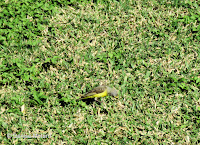YELLOW-FRONTED CANARY
YELLOW-FRONTED CANARY (serinus mozambicus) – (See images below)
DESCRIPTION: The Yellow-fronted Canary is a small passerine part of the large Finch family. It has a yellow forehead and a grey cap and nape. The back is olive and the wings and tail are mostly brown. The under parts are yellow. Females have duller colors. This species is about 5 inches (12 cm) long.
VOICE: This canary sings well, as other members of its family:
https://www.xeno-canto.org/species/Crithagra-mozambica
NAME: The bird’s English name was given after the Canary Islands. The Latin genus name is from Greek and means ‘barley hunter’, and the species Latin name refers to the location of the first identified individual.
HABITAT: Fields, gardens, parks, dry forest.
DIET: This canary is a seed eater and can be seen in groups foraging on the ground, sometimes with other seed eater species. It will also feed on insects.
NESTING: The nest is bowl-shaped and built in a tree. Three aqua eggs are laid on average.
DISTRIBUTION: The Yellow-fronted canary is native to Africa south of the Sahara. It has been introduced to Hawaii in the 1960s.
CONSERVATION: Because of its large range and no known threats and its facility at spreading, this species is listed as of ‘least concern’.
NOTES: The yellow-fronted canary is a popular cage bird (see reference below).
REFERENCES: https://en.wikipedia.org/wiki/Yellow-fronted_canary
https://identify.whatbird.com/obj/1129/identification/Yellow-fronted_Canary.aspx
http://www.finchinfo.com/birds/finches/species/green_singing_finch.php
http://hawaiibirdingtrails.hawaii.gov/bird/yellow-fronted-canary/
https://animaldiversity.org/accounts/Serinus_mozambicus/
Although this yellow-fronted canary is foraging on its own below, its ‘friends’ are not far as these birds are gregarious:
DESCRIPTION: The Yellow-fronted Canary is a small passerine part of the large Finch family. It has a yellow forehead and a grey cap and nape. The back is olive and the wings and tail are mostly brown. The under parts are yellow. Females have duller colors. This species is about 5 inches (12 cm) long.
VOICE: This canary sings well, as other members of its family:
https://www.xeno-canto.org/species/Crithagra-mozambica
NAME: The bird’s English name was given after the Canary Islands. The Latin genus name is from Greek and means ‘barley hunter’, and the species Latin name refers to the location of the first identified individual.
HABITAT: Fields, gardens, parks, dry forest.
DIET: This canary is a seed eater and can be seen in groups foraging on the ground, sometimes with other seed eater species. It will also feed on insects.
NESTING: The nest is bowl-shaped and built in a tree. Three aqua eggs are laid on average.
DISTRIBUTION: The Yellow-fronted canary is native to Africa south of the Sahara. It has been introduced to Hawaii in the 1960s.
CONSERVATION: Because of its large range and no known threats and its facility at spreading, this species is listed as of ‘least concern’.
NOTES: The yellow-fronted canary is a popular cage bird (see reference below).
REFERENCES: https://en.wikipedia.org/wiki/Yellow-fronted_canary
https://identify.whatbird.com/obj/1129/identification/Yellow-fronted_Canary.aspx
http://www.finchinfo.com/birds/finches/species/green_singing_finch.php
http://hawaiibirdingtrails.hawaii.gov/bird/yellow-fronted-canary/
https://animaldiversity.org/accounts/Serinus_mozambicus/
 |
| Yellow-fronted canary, Fort DeRussy Park |
 |
| Yellow-fronted canary, Jeremy Medina |
 |
| Yellow-fronted canaries, Waikiki |
 |
| Yellow-fronted canary, Diamond Head |